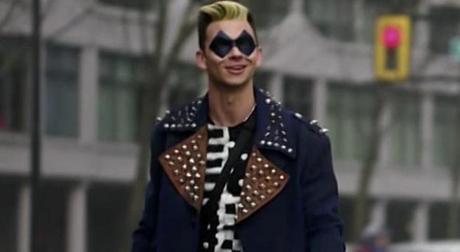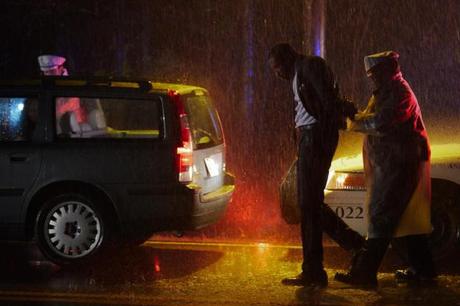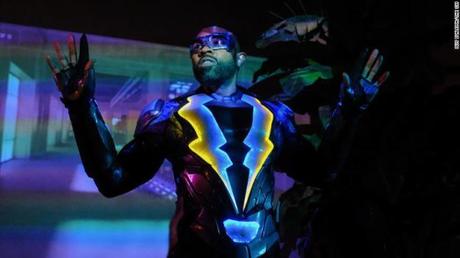Black Lightning feels like what would happen if someone crossed Morgan Freeman from Lean on Me with Mike Colter's Luke Cage and then fine-tuned it for the Trump age. It'd be a surprising, but welcome addition to the superhero canon even it wasn't airing on The CW. Speaking of which...
Ever since Daredevil premiered on Netflix in 2015 the CW's Arrowverse has been put on notice. Freed from the constraints of network TV, Daredevil went places - emotional, cinematic, violent places - Arrow either couldn't or didn't want to. This inevitably led Stephen Amell and the show's producers to occasionally talk in interviews about wanting to up their game, pull back on the soap opera and craziness which had overtaken the show's middle seasons. And they eventually followed through on that talk. Heck, post- Daredevil Arrow felt compelled to do a gun control episode.
Wait. What does this have to do with Black Lightning?
I'm getting to do that.
But at the end of the day, Arrow is still Arrow and the same is true of Flash, Supergirl, and Legends of Tomorrow. These are shows that are, as EW once put it, meant to inspire kids to put posters on their walls. They all look, sound, and feel the same, so very Vancouvery and so very CW in cast composition and performance. That's not really a bad thing. After all, the most recent crossover event between the four shows was certainly more fun than anything in Justice League.
Still, if the Netflix Marvel Universe is supposed to be for adults and teenagers who are ready for something with a harder edge and more mature themes, the Arrowverse is perfectly content staying in its own lane of mostly family-friendly entertainment. That means continued boilerplate vigilante stuff with a side helping of parental drama (since Oliver has a kid now) on Arrow, female empowerment and romantic melodrama on Supergirl, zany time travel shenanigans on Legends, and, I dunno, whatever the heck Flash is up to now.
That's entirely why Black Lightning currently wants no part of the Arrowverse even though it comes from the same executive producer, Greg Berlanti, responsible for all of those shows. I mean, you couldn't pick a stranger transition than last night's episode of Flash ending with this image:

And then segueing into "Strange Fruit" playing underneath the opening minutes of Black Lightning's pilot. Clearly, Black Lightning is announcing itself as the first CW superhero series to finally take on the challenge of living up to the kind of work Marvel and Netflix have been putting together. Arrow will never be Daredevil or The Punisher, but Black Lightning is a lot damn closer to Luke Cage than ever could have been expected, largely because by being cut off from the Arrowverse it's been freed to do its own thing, both visually and thematically.
Like Luke Cage, Black Lightning features a predominantly black cast and is proudly and loudly about being a black man, to the point that our central hero, widely beloved, but strict high school principal Jefferson Pierce (Cress Williams), is racially profiled and pulled over by unapologetic cops in the opening five minutes. Dressed in a nice suit and driving a nice car, he is dehumanized by the cops right in front of his two daughters, Anissa (Nafessa Williams) and Jennifer (China Anne McClain,) both of whom are also threatened when they voice their outrage. When the cops let him go, he calls after them demanding an explanation. An Asian woman's store had been robbed by a black man. Simple as that. Finally pushed too far, Jefferson's eyes light up with lightning and the police car suddenly, but only momentarily loses power. The narration from one of his daughters informs us this is the moment Black Lightning was reborn.

It's hardly a subtle scene, but in 2018 racism in the real world sees no need to remain subtle anymore. In fact, this scene is inspired by co-showrunner Salim Akil's continued experiences with being pulled over by the cops for "driving while black" and how the one time he refused to play nice about it he almost got himself killed. Translating this into a superhero context equates to a cathartic, cheer-out-loud moment, giving literal superpowers to the powerless. It's revisited later in the episode in a scene where Jefferson unleashes his full lightning powers on a separate pair of cops threatening him.
Of course, in the minutes immediately before being pulled over Jefferson is quoting Martin Luther King, Jr. at his daughter (who was arrested after taking part in what was supposed to be a peaceful protest) only to have her quote Fannie Lou Hamer back at him. The relationship dynamics obviously differ, but it's not hard to see this and immediately think of Luke Cage and Pops debating Donald Goines, Chester Himes and other notable black authors other over on Netflix. Black Lightning's husband-and-wife showrunners Mara Brock and Salim Akil want to educate us just as much as Luke Cage 's Cheo Hodari Coker.
The difference is Luke Cage is as much about a place as it is about a people. That is a show wholly and completely about Harlem, right down to Coker's frequent Harlem history lessons worked into the mouths of the heroes and villains. Black Lightning isn't nearly as location-specific, generalized enough that it might as well be taking place in Belair-Edison, Inglewood or Ferguson, anywhere where Black Lives Matter resonates, gangs flourish, and police hostilities constantly boil over. Moreover, Black Lightning 's hero is a father of two whose superhero days are supposed to be behind him. Over the course of the pilot, we discover his superhero past cost him his wife, who filed for divorce rather than watch her husband continually put himself in danger, but it's been nearly a decade since he used his powers, choosing instead to save more lives as an educator and community leader.
But then some local gang members take his daughters.
What ensues after that in the pilot's finale is arguably the only area of the show where you can at least kind of tell this has been co-produced by Berlanti and his partner Sarah Schechter. The Akils comes to Black Lightning from a drama-comedy background, specifically the shows Being Mary Jane and The Game. Berlanti and Schechter's role is to provide them with technical assistance and guidance, showing them the ropes on how to put together superhero stunt scenes, special effects, and costume design.

The actual Black Lightning costume, in particular, looks like something you'd see in the Arrowverse, especially Legends. Contrast that with Luke Cage simply wearing a hoodie as his costume, Choker's tribute to Trayvon Martin. Plus, the idea that nobody would recognize Jefferson simply because he wears fancy goggles covering his eyes and digitally alters his voice like Oliver Queen is a ludicrous, yet familiar Arrowverse (and, in general, superhero) trope.
However, it still works, partially because the pilot lovingly mocks the costume, using old newsreel footage of a man raving about being saved by Black Lightning to refer to the costume as a goofy, Parliament Funkadelic getup. Beyond that, it works because Cress Williams is so damn good. Ditto for the actresses playing his daughters. And the show so perfectly marries the silly and superheroic with drama, character, and obvious relevance.
THE BOTTOM LINEIn the face of police racism and rampant gang violence, the world of this show clearly has a renewed need for Black Lightning. Like Luke Cage, we are meeting Jefferson in the middle of his journey. His origin story won't come until later via flashbacks, and his return to action might just cost him his chance at reuniting with the ex-wife he so clearly loves. He also has his own Kingpin-like figure to topple (Tobias Whale). Thus, the stage has been set for what promises to be a strong season of superhero TV, as the CW has finally upped its superhero game to something closer to what Marvel and Netflix have been doing for years.
RANDOM PARTING THOUGHT- Greg Berlanti on whether Black Lightning will ever be a part of the Arrowverse: "As far as I know everyone's always wanted [Black Lightning to be separate]. Salim wants that. And the studio and the network want that. They're very different tonal shows. As people watch them. I'm not sure they could sort of ever quite imagine yet how we would be able to ever connect those things. It's always existed outside."
What about you? Let me know in the comments.

